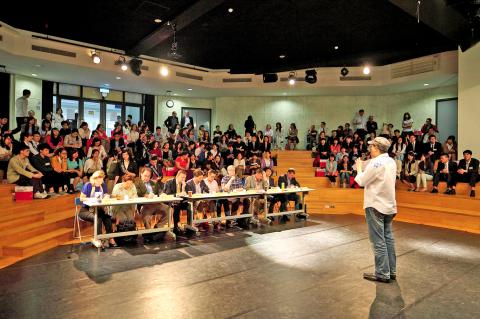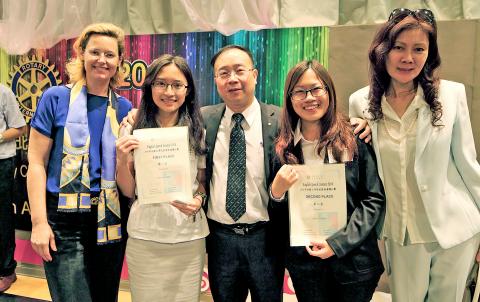On a breezy early afternoon at a workshop held on the campus of National Chengchi University a couple of weeks ago, the dozen or so participating students were called, one by one, onto the stage to speak in front of the audience. It could have been a stressful experience for any student unprepared for the exercise, but the atmosphere was supportive and welcoming. French lecturer Jean-Loup Fayolle congratulated everyone who went up on stage. And instead of techniques, the emphasis was placed on expressing oneself freely and without fear.
The touring workshop in communication skills is designed to prepare students for the upcoming English Speech Contest (ESC) organized by the Rotary Club of Taipei.
The contest will take place on Saturday, with “light” as the main topic to be discussed.

Photo courtesy of Rotary Club of Taipei
“It is not a competition in the traditional sense,” says Gabriele Seewald, the chairwoman of the ESC committee this year.
“Students are encouraged to come, participate, enjoy the experience and realize that there is really nothing to be afraid of [when speaking publicly]. There is nothing you can do wrong.”
Tomorrow is the deadline for registration, and complete details can be found online at: www.rctaipei.org.tw/ESC2015.

Photo courtesy of Rotary Club of Taipei
LONG-ESTABLISHED CONTEST
In its 61st edition, the annual contest is open to college and university students in Taiwan.
Prizes include a scholarship to study English at Canada’s Niagara College Canada, including homestay accommodation and airfare, and internships at ICRT and the British Chamber of Commerce in Taiwan.
This year’s awards also include summer internships at organic farms in Queensland, Australia and the town of Die in southern France.
A committee is chosen every year by club members to be in charge of the contest. A team of 50 to 60 judges, all Taiwanese and expat volunteers, are assembled for the competition consisting of prepared speeches in rounds one and two, and impromptu speeches for the final round.
Seewald says the main goal of the contest, which is to help students further their English-language skills and develop the ability to express themselves.
TALKING POINTS
For first-time contestant Eric Lee (李佑軒), a second year Spanish major at NCCU, the competition provides him with the opportunity to express himself and communicate with others.
Lee, who has participated in speech contests since he was young, says he has a passion for learning languages, and communicating with people is a source of fulfillment.
“I like to make friends from all over the world and use different languages to communicate with them... Every time I learn a new language, I feel happy and fulfilled,” Lee says.
Lee also sees the contest as a challenge.
“Of course I was a bit nervous, worrying whether or not I could prepare in a short period of time. But you just have to be brave, sign up and do it… I think it is very important to keep challenging yourself,” Lee says.
A sophomore at NCCU’s Department of Journalism, Stephonne Chien (簡卉萱) took first place last year. The biggest gain from participating is to learn from others.
“There is a big difference between speech contests in high school and college. At the college level, you can’t just recite a speech. It is more like a TED talk. You need to take pauses ... and be expressive,” Chien says.
And what advice does Chien give to this year’s competitors?
“Don’t worry too much about losing. Everyone in that small room [where the final round is held] is very good and feels very confident about themselves. If you slip, take a breath and move on to the next sentence. No need to beat yourself up over mistakes,” Chien says.
Seewald says independent thinking is also a key to success. From her experience as an ESC judge for the past two years, a promising development has already taken place.
“When I first participated a judge, I thought that the students’ English speaking ability was excellent, but most of them felt like they were giving a speech that was written by someone else,” Seewald says.
“Last year, I noticed there were already more students who were able to express their own ideas. It’s not their parents or teachers who told them what to say and how to say it,” she adds.
Last year, Chien earned the opportunity to attend a summer English program at the University of Canberra in Australia. It was her first time living abroad, and the experience, enriched by the time spent with her classmates and Australian host family, was eye-opening.
“The point is really not to study English but to open yourself up to a different culture.”
The 2015 ESC is set to take place at Taipei European School, located at 727, Wenlin Road, Taipei City (台北市文林路727號). The deadline for application is tomorrow. For more details and registration, go to www.rctaipei.org.tw/ESC2015.

In the March 9 edition of the Taipei Times a piece by Ninon Godefroy ran with the headine “The quiet, gentle rhythm of Taiwan.” It started with the line “Taiwan is a small, humble place. There is no Eiffel Tower, no pyramids — no singular attraction that draws the world’s attention.” I laughed out loud at that. This was out of no disrespect for the author or the piece, which made some interesting analogies and good points about how both Din Tai Fung’s and Taiwan Semiconductor Manufacturing Co’s (TSMC, 台積電) meticulous attention to detail and quality are not quite up to

April 21 to April 27 Hsieh Er’s (謝娥) political fortunes were rising fast after she got out of jail and joined the Chinese Nationalist Party (KMT) in December 1945. Not only did she hold key positions in various committees, she was elected the only woman on the Taipei City Council and headed to Nanjing in 1946 as the sole Taiwanese female representative to the National Constituent Assembly. With the support of first lady Soong May-ling (宋美齡), she started the Taipei Women’s Association and Taiwan Provincial Women’s Association, where she

Chinese Nationalist Party (KMT) Chairman Eric Chu (朱立倫) hatched a bold plan to charge forward and seize the initiative when he held a protest in front of the Taipei City Prosecutors’ Office. Though risky, because illegal, its success would help tackle at least six problems facing both himself and the KMT. What he did not see coming was Taipei Mayor Chiang Wan-an (將萬安) tripping him up out of the gate. In spite of Chu being the most consequential and successful KMT chairman since the early 2010s — arguably saving the party from financial ruin and restoring its electoral viability —

It is one of the more remarkable facts of Taiwan history that it was never occupied or claimed by any of the numerous kingdoms of southern China — Han or otherwise — that lay just across the water from it. None of their brilliant ministers ever discovered that Taiwan was a “core interest” of the state whose annexation was “inevitable.” As Paul Kua notes in an excellent monograph laying out how the Portuguese gave Taiwan the name “Formosa,” the first Europeans to express an interest in occupying Taiwan were the Spanish. Tonio Andrade in his seminal work, How Taiwan Became Chinese,